ROG Phone 9 Pro vs iPhone 16 Pro Max: 3 nm in the right direction
We may earn a commission if you make a purchase from the links on this page.

Intro
The ROG Phone 8 shed the skin of the hypebeast gamer phone and went for a more subtle look and shape. The ROG Phone 9 repeats those steps and proudly comes with the brand-new Qualcomm Snapdragon 8 Elite chip.
That's right, the first 3 nm SoC for Android phones here and it's in an overtuned, overspecced package. We have the ROG Phone 9 Pro, and of course one of the first things we did was clash it against the iPhone 16 Pro Max!
If you live in the US, you had to wait for a bit — the ROG Phone 9 launched internationally in December, but will be coming stateside this coming January. Well, now that you will finally be able to buy it, maybe the question is lingering in your mind — how does it compare to the big, bad iPhone?
It still lacks in the camera department, though it's pretty impressive with video recording. But the ROG Phone 9 Pro excels where it's supposed to — massive performance gains, and a lot of gaming comfort thanks to the peripherals and hardware!
ROG Phone 9 Pro vs iPhone 16 Pro Max differences:
| Asus ROG Phone 9 Pro | Apple iPhone 18 Pro Max |
|---|---|
| 6.78-inch, 185 Hz AMOLED screen | 6.9-inch, 120 Hz OLED screen |
| Aluminum frame, matte glass back, LED lights on the back | Titanium frame, matte glass back |
| Triple camera, physical gimbal, 3x telephoto | Triple camera, sensor shift, 5x telephoto |
| Snapdragon 8 elite, 3 nm, 4,32 GHz | Apple A18 Pro, 3 nm, 4.04 GHz |
| Gaming triggers, fan accessory with gaming buttons | Camera Control button, Action Button |
| Powerful, meaty stereo speakers | Loud stereo speakers, which sound clearer |
Table of Contents:
Read more:
- Asus ROG Phone 9 Pro review: power overwhelming
- iPhone 16 Pro Max review: bigger screen, bigger opportunities
- Asus ROG Phone 9 Pro review: power overwhelming
- ROG Phone 9 Pro vs ROG Phone 8 Pro: wait, which is which?
Design and Size
Tech powerhouses, all dressed up
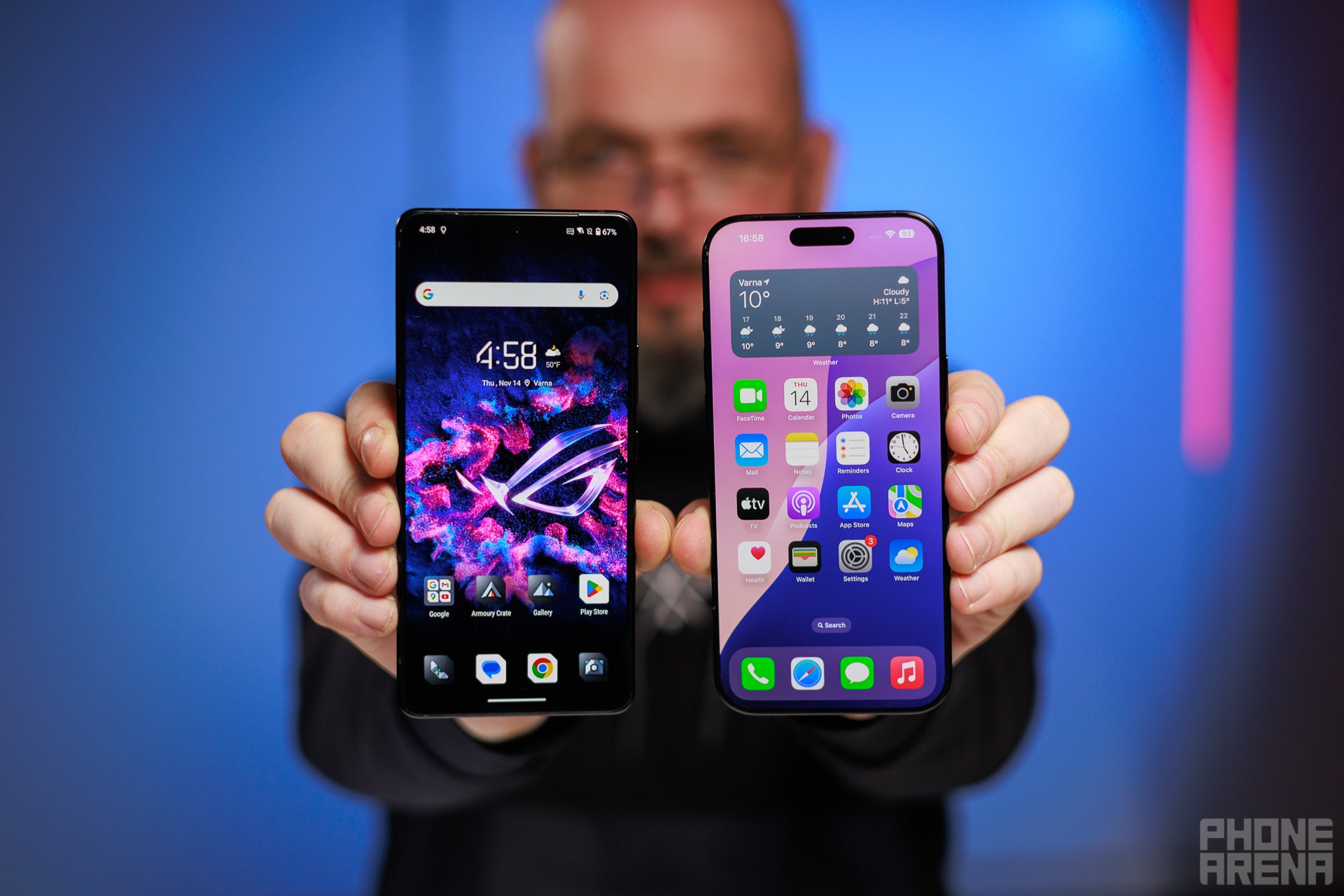
The ROG Phone 9 Pro now tries to look a bit more subtle than its predecessors, with more subdued accents and less overbearing elements. However, with a LED matrix on the back, you can still have flashy animations to showcase how special that phone is.
Otherwise, it's a glass sandwich device, with an aluminum frame and a matte finish over the back, which feels grainy and nice to the touch. The bezel around the display is quite thin and uniform, so it does feel like you are holding an all-screen phone.
The iPhone 16 Pro Max has also gotten a bezel treatment this year, as its frame shrunk furhter and the screen grew to 6.9 inches. The frame around it is covered in titanium for an extra premium feel, and the glass back is a smooth, fine matte.
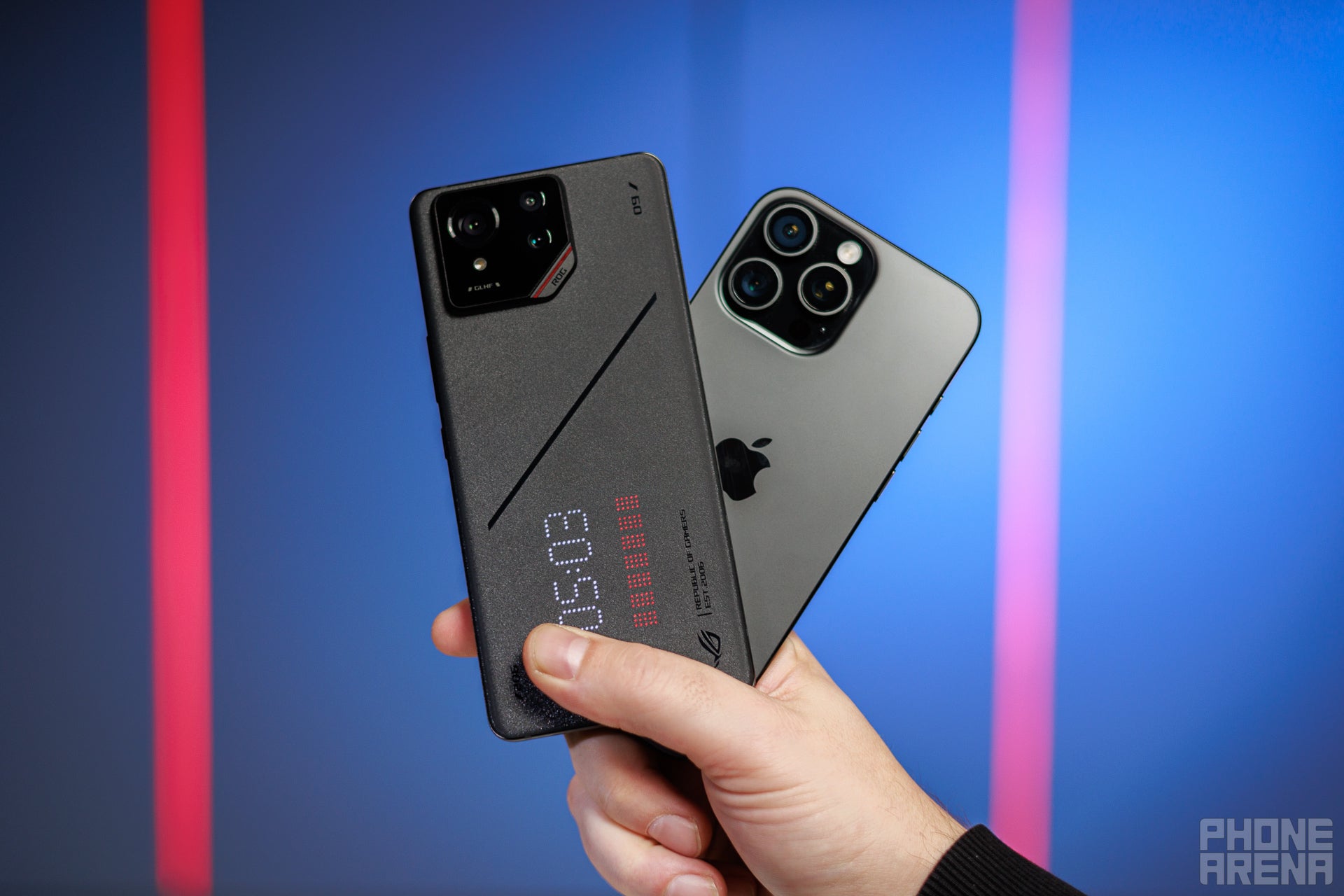
Both these phones have specific buttons on top of the typical power and volume. The ROG Phone 9 Pro has the ultrasonic shoulder pads for gaming — emulating the triggers on a conventional controller or handheld console. The iPhone 16 Pro Max has the Action Button, which can be customized to open a specific app or do a task, and the new Camera Control button that opens up the Camera app and also controls it via taps, slides, and presses on the button.
For color options, you can get the ROG Phone 9 Pro in any color you want — as long as it is black. The non-Pro variant also comes in white, but that about does it. The iPhone 16 Pro Max comes in a selection of tame and muted colors — natural titanium, desert, white, and black. So, a bit more choice there, but they also aren't flashy.
Display Differences
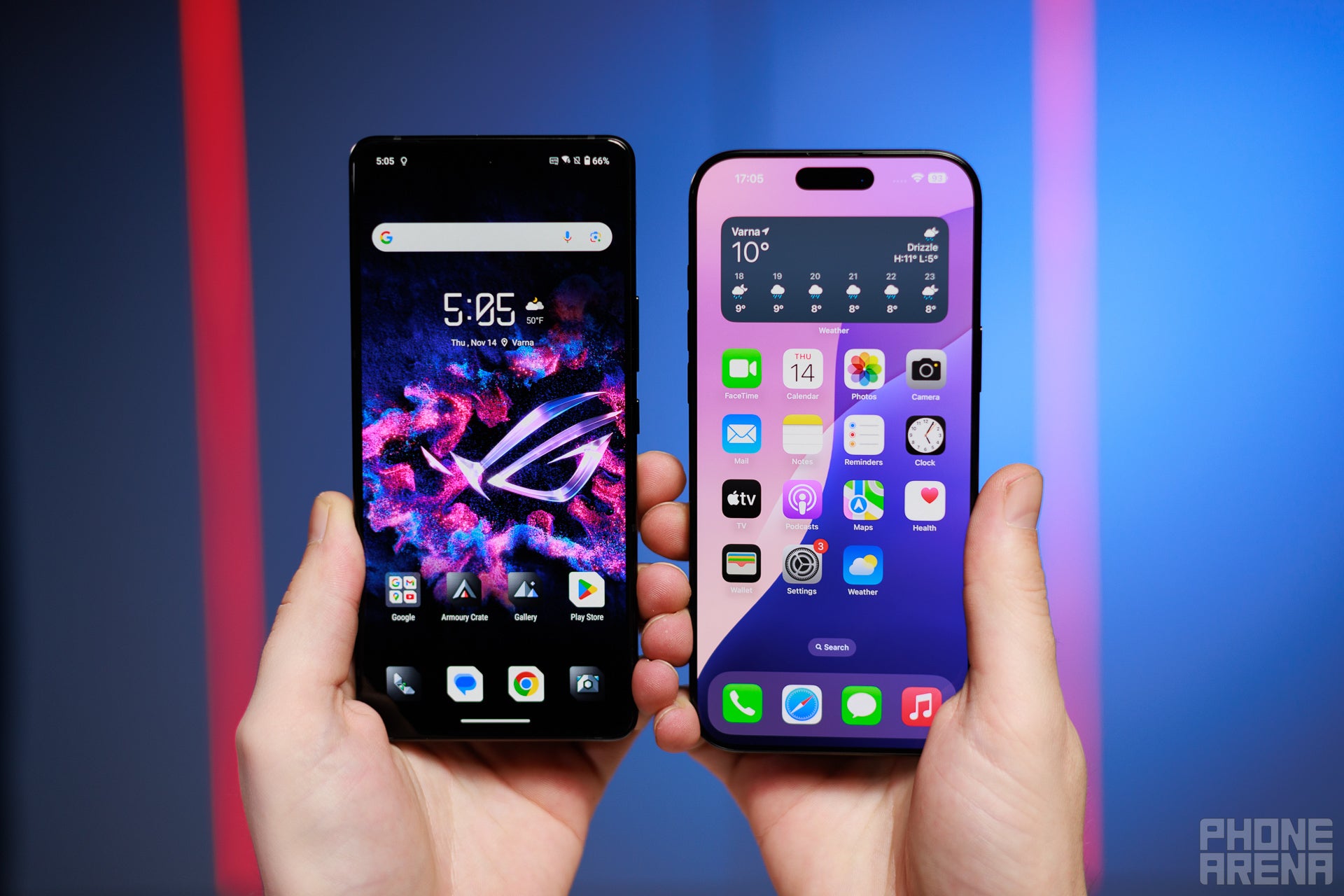
We have excellent OLED panels on both. The ROG Phone 9 Pro now goes up to 185 Hz refresh rate, which is honestly over the top. Scratch that, 165 Hz was already over the top, but hey — it can do it! It has a few color calibrations to pick from, whether you like warm and natural tones, or more punchy and contrasty screens.
The iPhone 16 Pro Max comes with a 120 Hz ProMotion screen with its own excellent color calbration. And both phones offer blue light filtering when the sun sets, for less eye strain, too.
They are quite sharp, the ROG Phone 9 Pro has an FHD+ resolution for 388 pixels-per-inch, Apple has a weird spread of 2868 x 1320 pixels, which results in 458 PPI. And both are HDR capable, the ROG Phone 9 Pro has a peak brightness of 2,500 nits, the iPhone hits 2,000.
One complaint about the ROG Phones that we have is that they don't go low enough on minimum brightness, so they are not super comfortable for bedside viewing.
For unlocking the phone, Asus employs an optical fingerprint scanner under the display. It's the optical kind and while it's quick and mostly accurate, it can also be picky if you press too hard or light, if your finger or screen has a smudge. The Face ID on iPhones works quickly and flawlessly and only requires you to look at the phone.
Performance and Software
The Elite versus the Pro
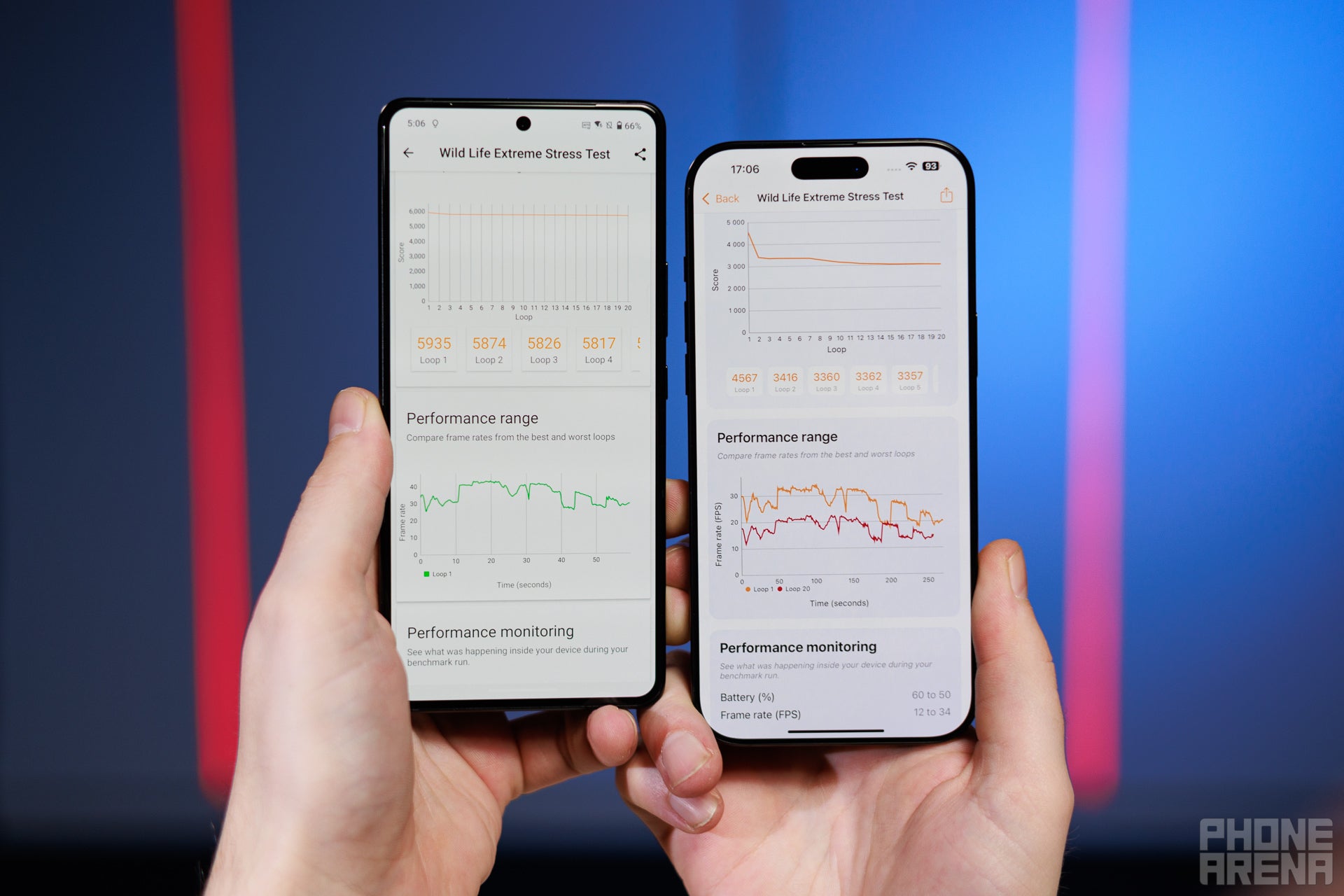
The time for the Android processor to evolve has come. Apple switched to a 3 nm build process with last year's A17 Pro, and Qualcomm now has its 3 nm answer — the new Snapdragon 8 Elite.
Is it a big deal? Well, no, 3 nm is actually quite small. On a more serious note, it simply means that there's less gap between the components inside the chip. Meaning, it can stack more transistors for more power, all while being more energy efficient.
The Apple A series chips have been quite ahead of the competition for years now. So, the Snapdragon 8 Elite is more than a welcome surprise. Check out these benchmark results:
Performance Benchmarks:
So, not only does the ROG Phone 9 Pro stand toe to toe with the iPhone 16 Pro Max — it can actually outrun it. We'd also like to point out that the ROG Phone barely throttled during the 3DMark stress test (which is designed to force a throttle), and it ran relatively cool thanks to the excellent thermals inside. We've seen other gaming phones achieve a "no throttling" result, but their metal frames would become scorching hot.
And yes, in real life, the Asus phone is unbelievably fast and snappy. It downloads and runs anything from the Play Store without missing a beat, it handles task switching and scrolling around almost like it's moving a couple frames into the future.
The iPhone is, of course, incredibly smooth and fast in its own right. And, look, you may have the super-powerful hardware, but at the end of the day, we will ask "OK, what does it run?". And this is where Apple still has the upper hand — the App Store has actually started getting actual console titles, ported to the iPhones and iPads. No, not the old shabby "ports", which were low-grade remakes of the games. But the actual, actual games — Assassin's Creed, Resident Evil, Death Stranding. Apple's push into the gaming space has us thinking that other partnerships may also be on the horizon.
The ROG Phone 9 Pro, while incredibly powerful and convenient to game on, is tied down to what the Android Play Store can give you. Thankfully, we have some major titles like Modern Warfare, Arena Breakout, Genshin, even the good old PUBG. But developers still seem to be wary with experimenting in the mobile space.
But hey, maybe these titles are enough for you, maybe you also like to fire upp the odd emulator from time to time. The ROG Phone 9 Pro provides that power.
These wouldn't be 2024 phones if we didn't mentioin AI, right? The ROG Phone 9 Pro comes with a couple of AI tricks. One is a summary function for your voice recorder, transcribing and summarizing meetings. The other is a live translator for bi-lingual phone calls, which is a bit clunky but quite rare — the only other phones that give us that feature are Samsung's Galaxies for now. The third more general AI feature of the ROG Phone 9 is semantic search — whether in the phone's photo album or in the settings, you can be more liberal with the seach terms, and the AI will try and figure out exactly what you are looking for, which is quite convenient.
The rest of the ROG AI features have to do with games — it can auto-record killstreaks, it can give you tips on when a booster has spawned (MOBA games), auto-running, auto item pickup, and other small assistive features while gaming. To be fair, most "hardcore" gamers (a.k.a. this device's target demographic) would probably view it beneath them to use such assistive features, but hey — who knows.
Apple's iOS 18 is slowly getting its Apple Intelligence features. We already have Clean Up (Magic Eraser) in the Photos app, call transcribing, ChatGPT integration with Siri, Visual Intelligence (AI image lookup with the camera). What's left is a smarter Siri, which can access features and functions within apps, but that update has been postponed.
Now for the bad news — the ROG Phone 9 still only comes with a 2 Android build update commitment, and 4 years of security updates post release. Apple's iPhones are known to get at least 5 years of iOS updates. That number might go up, now that Samsung and Google are both committing to 7 years of Android updates, but Apple hasn't said anything yet.
Camera
ROG falls behind
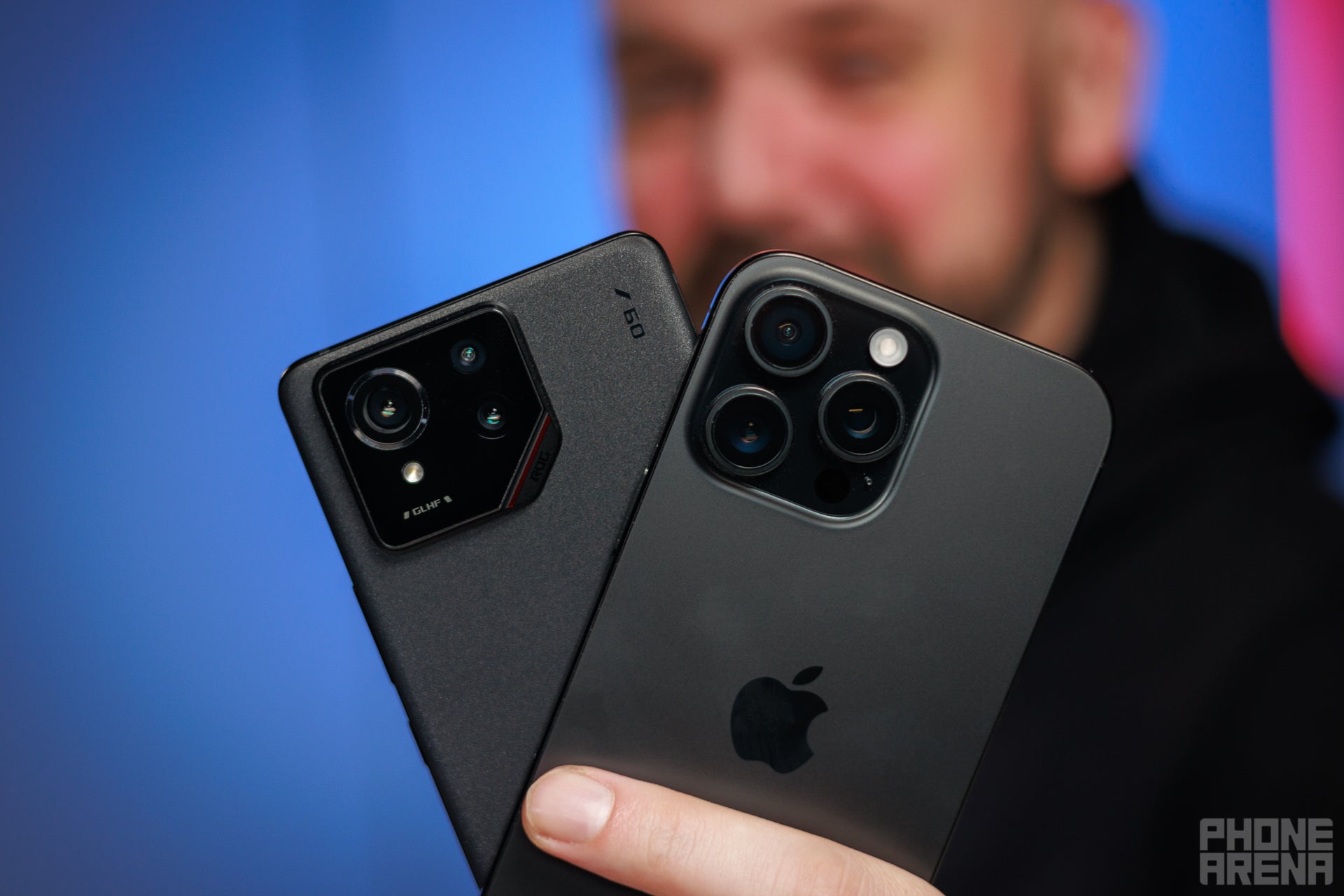
The ROG Phone 9 Pro comes with an upgraded main camera sensor — still 50 MP, but now a Sony Lytia 700. It rocks a hybrid gimbal stabilizer for a 5-degree wobble compensation, it does work quite nicely. Other than that, there's a 32 MP 3x telephoto camera, 13 MP ultra-wide, and a 32 MP selfie camera.
Impressive numbers, but putting them toe to toe versus the iPhone 16 Pro Max's cameras — 48 MP main camera with sensor shift stabilization, 12 MP 5x telephoto, and 48 MP ultra-wide — the iPhone produces better-looking photos. We did complain about Apple leaning into oversharpening its images a bit, ever since it started using a 48 MP sensor. But the Asus does more of it. The dynamic range and colors on the iPhone photos are also better, with more pop to them, and closer to reality:
Main Camera - Day

ROG Phone 9 Pro

iPhone 16 Pro Max

ROG Phone 9 Pro

iPhone 16 Pro Max

ROG Phone 9 Pro

iPhone 16 Pro Max
And here, it's visible how the ROG Phone's dynamic range is a bit limited. The photos look a bit overexposed, which gives them a distinct "washed out" look when compared directly to the iPhone's pictures. The latter has a wider dynamic range with deeper, but more visible blacks. The elevated contrast also helps colors pop more, and appear more life-like.
Main Camera - Low-light

ROG Phone 9 Pro

iPhone 16 Pro Max

ROG Phone 9 Pro

iPhone 16 Pro Max

ROG Phone 9 Pro

iPhone 16 Pro Max
At night, the ROG Phone does manage to bring some color and warmth back in its photos. But here, you might notice its oversharpening becoming even more visible in fine details, like leaves or brick lines. The iPhone photos are also offenders here, but it seems that less of the fine detail was lost to noise reduction.
Zoom Quality
At 3x zoom, the ROG Phone should have the advantage here, since it has a native 3x lens, while the iPhone is using a crop in the main sensor. Yet, the 3x shot from the iPhone looks sharper, more detailed, with less noise. At 10x, the iPhone is using its 5x lens as a jumpoff point, the ROG is relying on the 3x, and both are enhancing digitally. At that point, both images look a bit degraded — there's a bit of noise creeping in the iPhone photo, some excessive smoothing on the ROG photo. But both seem about equally share-able.
Just as with the main cameras, the differences in the ultra-wide cameras show a wider dynamic range and more vivid colors from the iPhone shots.
Selfies
For selfies, the iPhone gives my face more livelier colors and the details and marks of time on my skin are more visible. I look quite pale in those ROG Phone 9 shots, thought the details are not too bad. In fact, nighttime selfies with the ROG Phone are a bit sharper.
Video Quality

We finally got to it, and you wouldn't believe it, but video recording is where the ROG Phone 9 Pro truly shines. We get more vibrant colors, much wider dynamics, nice details, and that stabilization is doing great work! Compared to the iPhone — it is the Apple camera that is now a bit pale and overexposed by comparison. Though, we did get some weird clicking in the ROG Phone audio in this particular clip. Was that wind noise reduction gone wrong? I was definitely not eating popcorn or rubbing a zipper against the phones while recording.
Audio Quality and Haptics
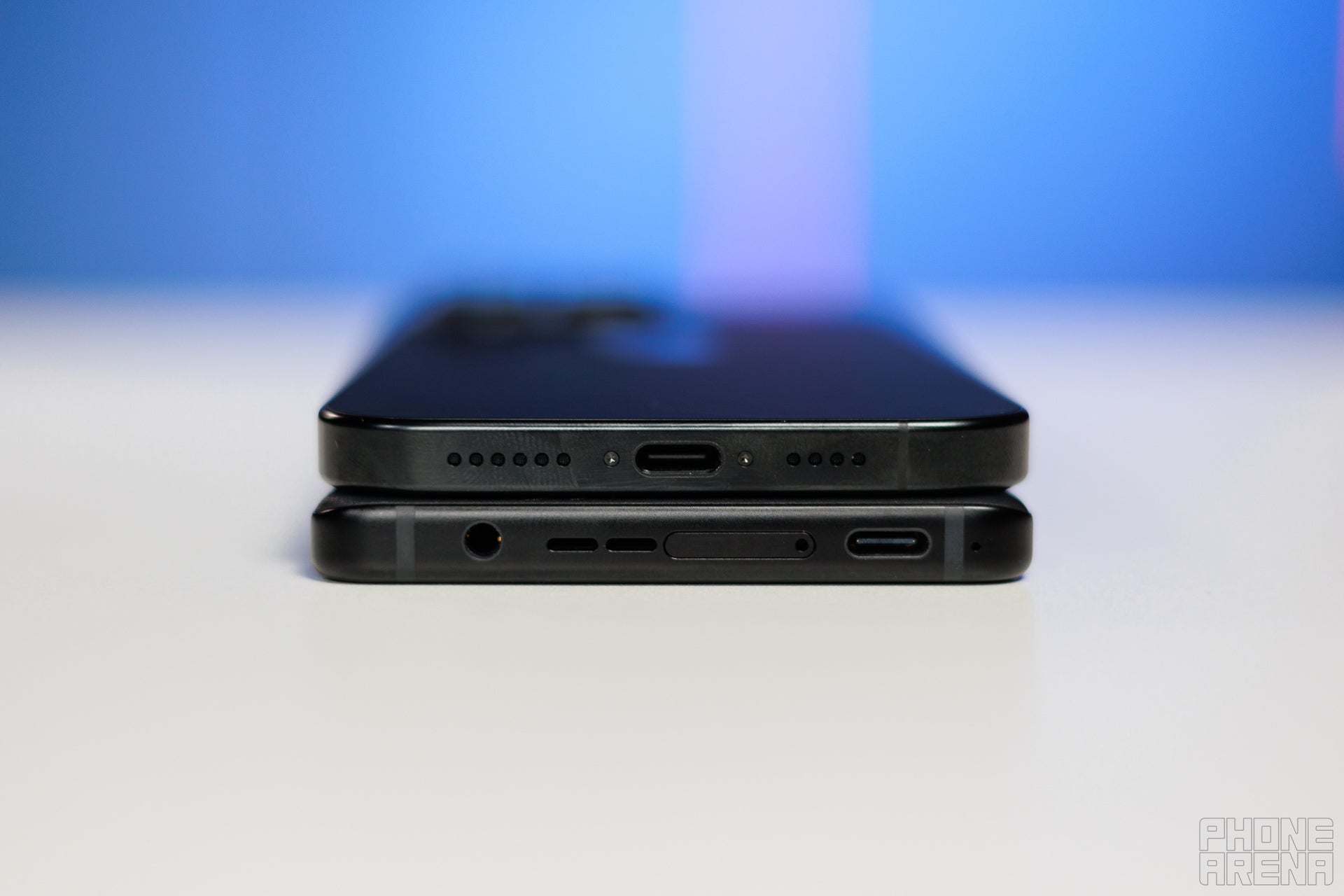
The ROG Phone 9 Pro has stereo speakers, but no longer front-firing like generations before. Honestly, the audio quality took a bit of a hit since Asus did that. They are still loud and meaty, for sure, but there's a certain clarity and presence that they are missing. The good news is that the new AeroActive Cooler X Pro accessory that launches with the ROG Phone 9 series brings the subwoofer back. And yes, this phone can sound as powerful as a Bluetooth speaker. Just not a top-tier Bluetooth speaker.
The iPhone 16 Pro Max stereo speakers sound excellent. Surprisingly excellent. Deep bass, cleaned up low mids, plenty of musical detail, and really sweet presence. And they are almost as loud as the ROG Phone 9 speakers (may be just as loud, but the mids of the ROG 9 would make you feel like they are louder).
But, another win for Asus here — the ROG Phone 9 Pro still retains a headphone jack. Kind of wild that there's room for it still, right?
For haptics, both of these phones are a pleasure to use. They click and clack with precise feedback, which is especially nice on the ROG Phone, where you get a reassuring vibration whenever you press one of the gaming triggers.
Battery Life and Charging
These just outlasted the Duracell bunny

The ROG Phone 9 Pro comes with an upgraded 5,800 mAh battery. That's already a massive battery, but with Asus' software optimizations on top, we were confident it would last for quite a while.
Conversely, the iPhone 16 Pro Max has a 4,685 mAh battery — the biggest battery an iPhone has had thus far. And hey, iOS is also excellent at freezing processes and preserving battery life. Here's how they did on our tests:
Both of these phones will comfortably last you north of 10 hours on a single charge. For mundane, regular web tasks — almost 20 hours. Needless to say, when we daily drive any one of them, battery fears aren't an issue.
In case you end up draining them to 0%, the Asus has the advantage here — the ROG Phone 9 Pro does ship with its own 65 W charger, which gives you 74% of power in half an hour on the wire. The iPhone is notirously refusing to adopt any form of fast charging for now...
Specs Comparison
And here's a clearer picture of how the ROG Phone 9 Pro vs iPhone 16 Pro Max specs look:
| ROG Phone 9 Pro | iPhone 16 Pro Max | |
|---|---|---|
| Size, weight | 6.45 x 3.02 x 0.35 inches (163.8 x 76.8 x 8.9 mm) 8.01 oz (227.0 g) | 6.30 x 3.02 x 0.32 inches (159.9 x 76.7 x 8.25 mm) 7.80 oz (221.0 g) |
| Screen | 6.78" OLED 185 Hz | 6.9" OLED 120 Hz ProMotion |
| Processor | Qualcomm Snapdragon 8 Elite 3 nm | A18 Pro 3 nm |
| RAM, Storage | 16 GB / 512 GB 24 GB / 1 TB LPDDR5X | 8 GB / 256 GB 8 GB / 512 GB 8 GB / 1 TB LPDDR5 |
| Cameras | 50 MP main 13 MP ultra 32 MP 3X zoom 32 MP front | 48 MP main 48 MP ultra 12 MP 5X zoom 12MP front |
| Battery | 5,800 mAh | 4,685 mAh |
| Charging | USB-C 65 W wired Qi Wireless charging | USB-C 20 W wired 25 W MagSafe |
And there you have it — the numbers look impressive. But really, the performance meets the expectations!
Summary
Will the ROG Phone 9 Pro pull people away from the iPhone 16 Pro Max? Probably not... it's a niche device, an enthusiast phone — you need to be a gamer, be willing to spend quite a bit of cash on a phone, and you need to be feeling adventurous to step away from the Apple, Samsung, and Google brands.
So, in some ways, the people that would buy a ROG Phone 9 Pro have already probably set their minds to it. However, it's always good to know how it compares to the other heavy-hitters out there, right?
Well, there you have it — it doesn't budge an inch. OK, the Asus camera is still not amazing, but it's above average for sure. And its video capabilities are surprisingly high. Is it a better all-rounder than the iPhone 16 Pro Max? No... Is it a fantastic gaming phone that you can use as a daily driver? Yes.

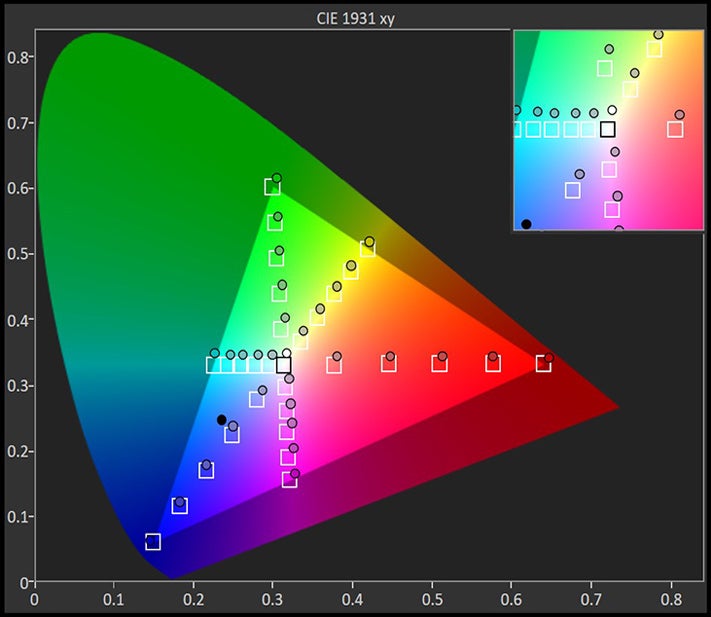




















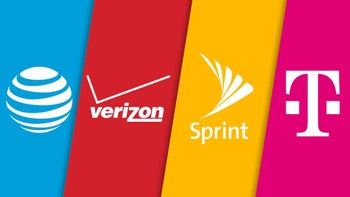













Things that are NOT allowed: